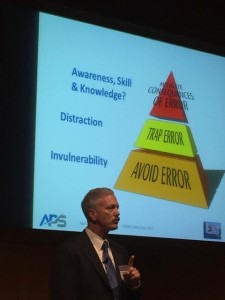 Randall Brooks, APS VP of Training and Business Development took a break from delivering Upset Prevention and Recovery Training at the APS Texas operation in Arlington, Texas to travel to Chicago as a presenter for the Chicago Area Business Aviation Association (CABAA) as a part of their annual Safety Day conference. Marking its tenth year, the CABAA program offers information addressing some of the greatest concerns and threats that corporate flight crews face and provides useful information to increase the safety of participants’ flight operations.
Randall Brooks, APS VP of Training and Business Development took a break from delivering Upset Prevention and Recovery Training at the APS Texas operation in Arlington, Texas to travel to Chicago as a presenter for the Chicago Area Business Aviation Association (CABAA) as a part of their annual Safety Day conference. Marking its tenth year, the CABAA program offers information addressing some of the greatest concerns and threats that corporate flight crews face and provides useful information to increase the safety of participants’ flight operations.
The presentations began with a keynote address by Peter Agur, chairman and founder of the Van Allen Group, an internationally respected business aviation consulting firm. His presentation on “The Power of Personal Professionalism” made it clear that every person in attendance had a responsibility and an obligation to provide safety leadership when they witness events or actions that compromise safety. Through personal examples and stories, Peter provided illustrations about how personal integrity could make a difference in preventing the erosion of safety margins, or even accidents themselves.
Walter Chartrand of the Aviation Safety Academy spoke on “How Employees Can Affect a Just Culture.” Mr. Chartrand made it clear that having an appropriate safety culture could not only improve the safety of an organization, but it is also bound to make it a more enjoyable, productive and fulfilling workplace at the same time.
The presentation by APS’ Randall Brooks addressed “The Growing Consensus on Loss of Control In-flight.” Randall shared his experience with international working groups, aviation rulemaking committee testimony, and the evolution of regulatory guidance directed at loss of control in-flight (LOC-I). Randall explained that the increased attention being devoted to the threat of LOC-I by multiple agencies and industry groups throughout the world is increasingly reaching fundamentally similar conclusions. A part of the LOC-I problem is related to human factors which cannot be entirely addressed in the simulator environment alone. Pilots should receive on-aircraft training in Upset Prevention and Recovery Training (UPRT) at some point in their career to comprehensively mitigate the LOC-I threat. Mr. Brooks concluded by sharing a simplified strategy which could address nearly all in flight upset events safely and effectively.
APS congratulates CABAA on their outstanding lineup of subject matter experts and all of the Safety Day attendees who showed their dedication to improving the aviation safety of their organizations through their attendance and participation.
Looking For More Information On UPRT?
Send us a message and one of our experts will be in touch shortly.




Comments: